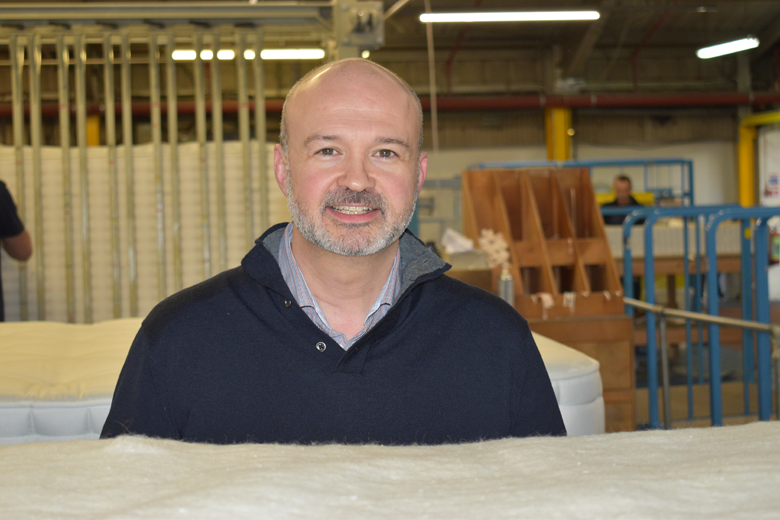Hypnos Expands its Sustainable Credentials with Newly Created Role

Royal warrant holder and award-winning luxury bedmaker, Hypnos, has announced the appointment of Richard Naylor in its newly created Sustainable Development Director role.
The job has been especially developed to meet Hypnos’ ambitious ongoing commitment to put sustainability at the centre of the company’s product development and innovation strategy, and to oversee its extensive and growing sustainable activity in support of the company’s wider low carbon, responsible and ethical business practices.
With almost 20 years in the bedding industry, Richard joins from Steinhoff, where he was Design and Development Director, bringing with him a wealth of experience in implementing innovative new materials, products and practises, that satisfy changing consumer needs and trends.
The eco-focused position at Hypnos will see him head up a dedicated team to drive world-class best practice in key areas of the business, including strategic supply chain management, material and product development– all with customer comfort and safety, plus sustainability and more eco-friendly methods at the core of this decision-making process.
Chris Ward, Group Marketing Director at Hypnos, comments: “When it comes to sustainability it drives every decision and action we make as a responsible business and the fact that this newly created role will sit at the heart of the company is a testament to our leadership in this area.
“Richard will bring a wealth of experience and energy to the position, greatly complementing the existing wide body of work we are already doing and helping to deliver a platform for continued sustainability growth.”
Richard Naylor, Sustainable Development Director at Hypnos, adds: “There is an increasing appetite from consumers, retailers and the hospitality industry for responsible and sustainable products made by ethically-run businesses. As such it’s more important than ever that companies look at ways in which they can meet this demand in order and create a positive environmental impact for generations to come. This is just one of the reasons I’m incredibly excited to be working at Hypnos - they’re fully committed to sustainability and infusing into everything they do.”
Renowned for its approach to sustainability, Hypnos created the role to underpin and spearhead an already impressive roster of green initiatives and a comprehensive sustainability journey and strategy that started some 10 years ago. Indeed, the company was the first carbon neutral bedmaker in the world and is the only bed manufacturer to have held this prestigious title for eight years, having offset a total of 6,820 tonnes of CO2, including 736 tonnes in 2017/18 alone.
As part of its ethical responsibilities the company also uses a range of natural and sustainable fibres to manufacture its products, including eOlusTM which made from recycled plastic based bottles. Through this innovative sustainable fibre alone Hypnos has re-used the equivalent of 165 million plastic bottles, which would have otherwise gone to landfill sites or into the world’s oceans.
In fact, Hypnos recognised that mattress disposal and recycling is woefully inadequate, with some seven million still going to landfill each year and provides a sustainable channel and take-back service to enable the de-construction of mattresses to create recycled raw materials for re-use in other industries. As such, all of Hypnos’ mattresses and beds are designed to be 100% recyclable at the end of their life in order to avoid languishing in landfills.
And the sustainable actions of the company don’t just stop there. Hypnos has ensured that a wide range of sustainable policies - including waste, energy, carbon reduction and the development of supply chain partnerships that prioritise traceability and animal welfare - are pursued across all areas of operations. Over 70% of its factory and office waste is segregated for recycling, with the aim of eliminating landfill. The company has also installed a biomass heating system, which uses a renewable heating source, at its Castle Donnington factory and the company purchases 100% renewable electricity at its sites.
